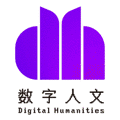您正在访问旧版存档页面。This is the old version archive of our site.
A Report on Digital Humanities at University College Cork
作者:Órla Murphy, Shawn Day, & James O’Sullivan;转自:公众号 DH数字人文
DH资讯
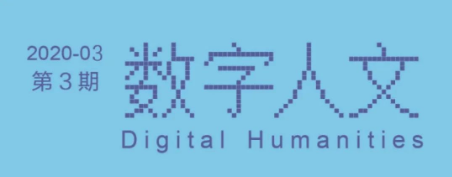
Órla Murphy, Shawn Day, & James O’Sullivan / University College Cork
————————————
The History of DH in Ireland and University College Cork
It is reasonable to say that the digital humanities (DH) have existed in Ireland’s institutes of higher education since the late eighties, certainly, the early nineties. As it was internationally, many of Ireland’s earliest practitioners did not explicitly identify with DH as a discipline, and their contributions to the fledgeling field came in the form of website building typically led by well-placed, influential individuals. It would be a decade or so before national universities and institutions would commit resources to the development of longer-term programmes of research and teaching in the digital humanities. Nonetheless, that first group of pioneers achieved several significant successes, developing high-profile projects which demonstrated the value of computers to the arts and humanities, stimulating interest in a domain which would soon become a significant part of Irish education. Such projects include CELT (Corpus of Electronic Texts)[1], a searchable database containing 1,636 contemporary and historical documents from across many areas of Irish history, literature, and politics, founded in 1992 by Donnchach Ó Corráin, Professor of History at University College Cork (UCC)[2]. CELT emerged out of CURIA[3], a collaboration between Ó Corráin and Peter Flynn to create a scholarly website for the Thesaurus Linguarum Hiberniae, Ireland’s first webpage and world’s ninth, making it one of the first and longest-running digital humanities projects that is still “live” today.
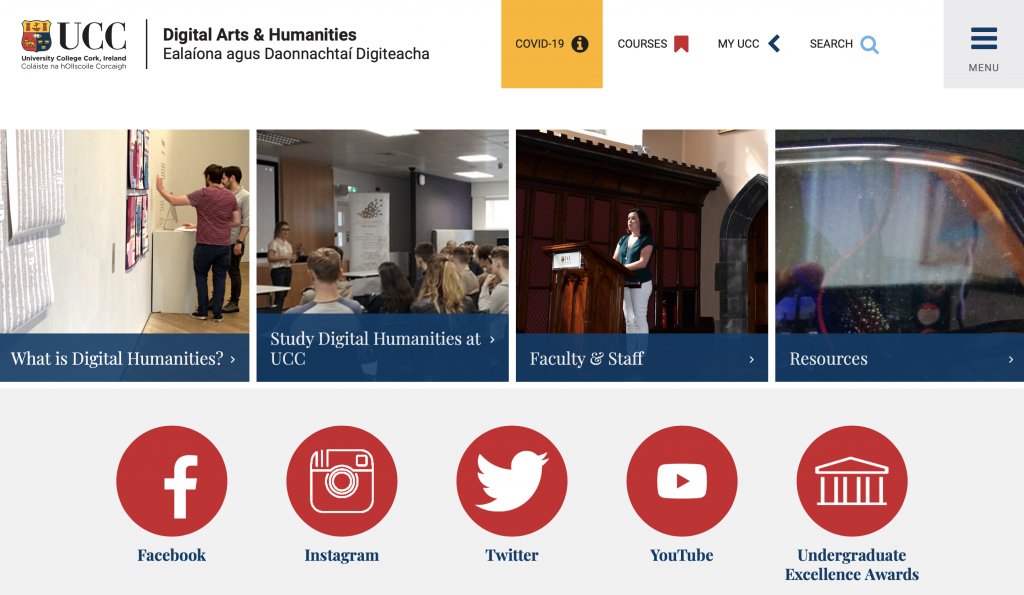
Matthew Gold terms the current epoch in which humanities scholars and their institutions are turning with increasing interest to computers as the “digital humanities moment”[4]. Ireland’s own “DH moment” really started in 2007 with the foundation of the national Digital Humanities Observatory (DHO), established to further develop and promote the discipline within Irish universities. Unfortunately, the activities of the DHO were short-lived, and the initiative was abandoned in 2013. The decision was primarily a consequence of the severe impact of the Great Recession on the Irish economy, to which policymakers responded with a range of austerity measures, including diminished supports for Irish education, which is generally public and thus relies heavily on state support. The digital humanities in Ireland, having previously benefitted from major State investment in higher education—the DHO was founded with €28m from a €1.2bn fund which the Irish government had made available to universities[5]—were soon suffering issues of sustainability. Reflecting on the situation with Irish DH at the time John Keating notes: “It is inconceivable that a software company would consider halting funding of their products’ maintenance immediately after release; yet an analogous position is faced by many highly significant digital humanities projects in Ireland currently.”[6]
The present situation with the digital humanities in Ireland is more positive, with many institutions having developed some measure of capacity in either DH research, pedagogy, or both[7]. Since 2010, building on the state investment in digital humanities at a national level, University College Cork has built a series of new programmes which leverage its traditions of interdisciplinary collaboration and cooperation. At University College Cork there has been significant institutional investment in the digital humanities, and the discipline now exists as part of a dedicated, devolved Department of Digital Humanities, founded in September 2019[8]. This department is leading digital humanities research and teaching within the institution, and in addition to the numerous publications and projects being produced by its faculty, offers an undergraduate programme, two postgraduate programmes, and a structured PhD programme. The department has been supported through substantial capital expenditure which has provided a state-of-the-art digital teaching and learning space designed by the DH team. This facility which allows for engaged digital pedagogy and features online broadcast facilities, a digitisation suite, and a student-centric modular space.
DH Programmes at University College Cork
1.Undergraduate Programme
Embracing the culture of connected curriculum previously mentioned, the development of a BA in Digital Humanities and Information Technology (CK118) was developed and deployed in 2015. This programme embraces the fertile interaction between specific skills and a programmatic mode of thinking of computer science and the critical analysis of digital impacts engendered by the digital humanities. The BA in DH & IT programme was created to combine skills development with an appreciation of a specific area of the humanities. The envelopment of a critical appreciation of how the application of digital skills to human endeavour grounds the digital humanities in practice.
The BA in DH & IT is a three-year programme with an optional year taken in either work placement or study abroad. Students undertake core digital humanities modules in theory, concepts, tools and methods over the three years of the taught programme. These are augmented with specialised modules in digital project management and research skills. They further choose amongst elective modules in digital curation, learning and knowledge creation, electronic literature or gender and race. The computer science stream of the programme introduces students to programming through Python and further explores programmatic practice in database development, web systems, data analytics, multimedia and digital content management.
Each student chooses a minor field in the humanities in which they complete several modules each year. This combination of threads within the programme equips students with an ability to undertake digital projects through skill development (the how), application to a humanities subject area (the what), with a critical appreciation of the implications and wider considerations of their practice (the why). This integrated programme remains cutting edge with constant evolution and renovation of the course material reflective of the rapidly changing nature of human engagement with technology.
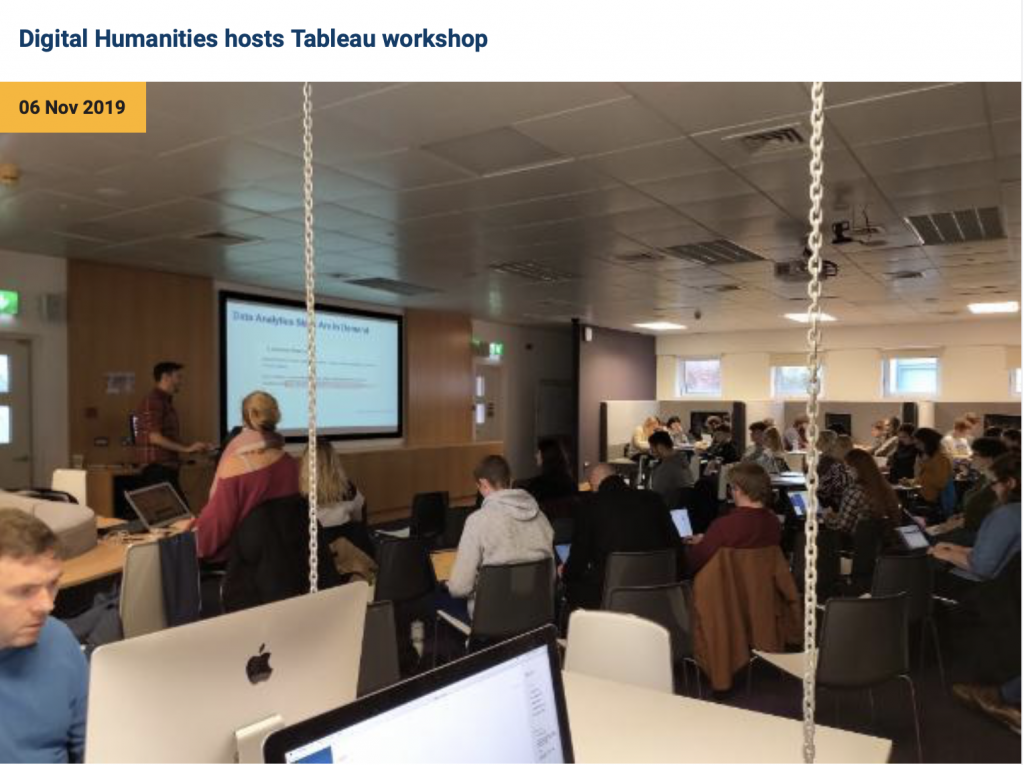
Students emerging from the BA in DH & IT have demonstrated great success in subsequent employment and postgraduate studies. Graduates of the programme have gone on to secure prestigious postgraduate funding through highly competitive calls, as well as work in a range of sectors, including cultural heritage, curation, data analytics, visualisation, while others have gone on to pursue entrepreneurial ambitions.
The connected nature of integrated learning has substantiated the value of the connected curriculum, which has subsequently been adopted broadly by the university itself. The core principles of this approach stem from the work of Dilly Fung and are: Research-based Teaching, Employability, Sustainability, Inter and Transdisplinarity, Global Reach, and Civic and Community Engagement[9]. In the BA in DH & IT programme, research and inquiry are emphasised as means of exploration and scholarly development.
2.Postgraduate Programmes
The PhD in Digital Arts and Humanities began in 2011 as part of a nationally-funded program between four Higher Education Institutions in Ireland. As a structured, thematic PhD it encourages incoming researchers to develop their potential with a set of taught modules designed to build researchers’ abilities in digital humanities in a range of topics, a foundation in key concepts and then introductions to a digital set of tools and methodologies to enable them to achieve their goals. Following on from this initial funding round, scholars in the discipline have annually received awards from the Irish Research Council to conduct original research in the field. To date, there have been thirteen graduates from the PhD programme in diverse fields across the arts, humanities and computer science.
In 2012, the development of the MA in Digital Arts and Humanities followed the PhD. Building on the work accomplished in the PhD at University College Cork, there was an opportunity to bring digital scholarship to the MA level to enable further growth. Adopting an ‘open inquiry’ approach, students are encouraged to develop their research ideas. There is a balance between the taught and the research elements of the MA, with the first two-thirds of the year spent working on taught modules. Through a series of iterations, the degree has been refined so that there is a clear framework in place to scaffold the students’ development as researchers throughout the programme. It encourages a multidisciplinary approach to the arts and humanities in a creative and scholarly atmosphere. The course gives students a grounding in how information and communications technologies can be used to capture humanities data sources in digital form to frame research questions, collaborate on research using social networking tools, and present results, both in print and online.
Realising that many students are in employment or abroad who wish to pursue Digital Humanities in Cork but are unable to attend in person, the online MA in Digital Culture was developed in 2014. Both MA programmes were recognised by the state when the Government of Ireland funded up to 30 places on the programmes in 2015 (both online and face-to-face offerings). Arts and Humanities graduates gained postgraduate qualifications that enabled them to make new contributions to the knowledge society. This year the Government will fund 20 places in a new Diploma in Digital Humanities, designed to heighten the digital competences of students. These awards will be delivered entirely through distance learning and explore and operate within our digital environment developing knowledge, skills and critical awareness through theoretical engagement and critical practice. Participants in the programme develop the practical skills needed to flourish in the digital age, while also examining the impact of the digital on culture, power and identity in society. The programme fosters those new digital literacies and digital competences of creativity, production and analysis essential in the contemporary world.
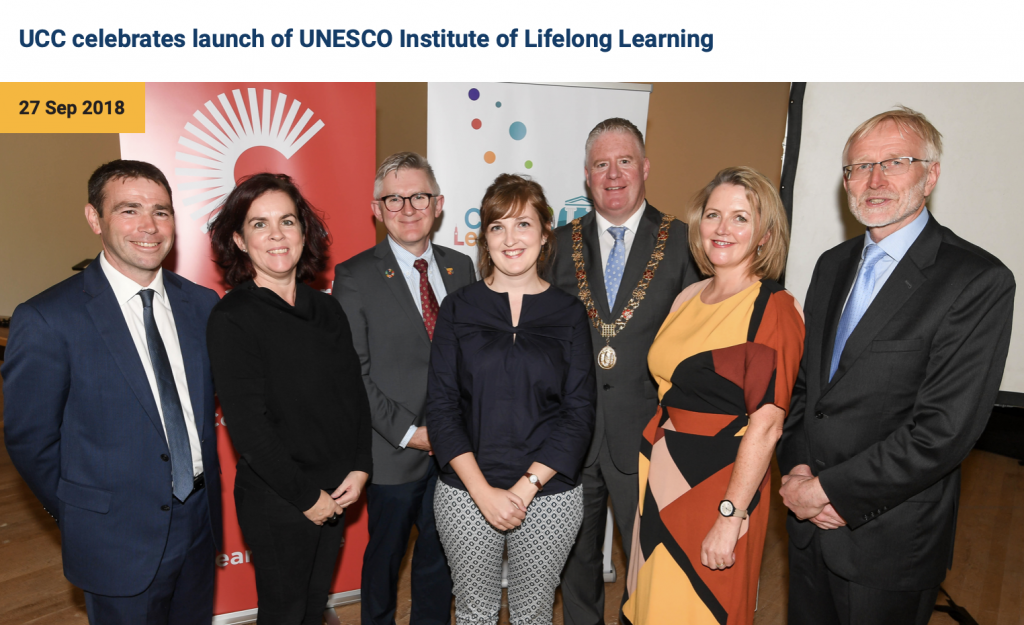
Reflecting on DH at University College Cork
The digital humanities still occupy something of a liminal space at most institutes of higher education across the globe. Scholars working either exclusively or extensively in DH are often tasked with defining and defending their discipline, distinguishing between the everyday activities of the digital age—like sharing information on the web—and more sophisticated, interpretative uses of computational tools for cultural analytics and the reinterpretation and representation of knowledge. Everyone in academia now accepts that DH is something, but not everyone appreciates or agrees upon what that thing might include. This challenge is mirrored in interactions with potential students, particularly at institutions where programmes in “digital humanities” are being offered the undergraduates and postgraduates. Most students are not engaged with international debates concerning the disciplinarity of DH, but rather, are simply wondering what they might do with a qualification in Digital Humanities. It is in this sense that the next great challenge of DH is articulating its value to broader society, much like other disciplines have been doing now for a very long time.
At University College Cork, the Department of Digital Humanities has very consciously sought to develop DH programmes which provide the flexibility necessary for students to develop as critical thinkers and cultural producers in the context of several implicit strands. Students may, depending on how they configure their course selections, develop expertise in areas like cultural analytics, digital culture, digital publishing, digital forms of expression like video games, and open knowledge, among others. While this means that students studying digital humanities at University College Cork do not typically develop into specialists the type of which would emerge from programmes dedicated to a precise sub-field or profession, they have traded specificity for a more all-encompassing view of a domain which remains inherently interdisciplinary and relatively emergent. The ethos is simple: show students all the things that might be counted as DH, and then let them form their own DH.
This approach to DH learning can only be facilitated in an institutional context like that which exists at University College Cork, where a dedicated DH department, staffed with expert faculty, is supported by the commitment and expertise of colleagues and administrators in a variety of other departments, schools and colleges. Most institutions do not possess the resources or will to form a dedicated department for the digital humanities, nor is it always culturally or administratively possible to engage in formal collaborations between entities across different schools in the arts, humanities, and computer sciences. It is in this respect that Digital Humanities at University College Cork is an interesting case study of what might be achieved where there is commitment to the development of DH as a formal discipline, and hopefully, the department, its research and programmes can encourage other universities to also recognise the disciplinary autonomy of DH.
编 辑 | 肖爽
注释:
[1]See celt.ucc.ie
[2]Formore on the people behind CELT, see: celt.ucc.ie/people.html
[3]Seecuria.ucc.ie/oldmenu.html
[4]Matthew K. Gold, “The Digital Humanities Moment,” in Debates in the Digital Humanities, ed.Matthew K. Gold, University of Minnesota Press, 2012,http://dhdebates.gc.cuny.edu/debates/1.
[5]PaulBenneworth, Magnus Gulbrandsen, and Ellen Hazelkorn, “Ireland: Valuing the Artsand Humanities in a Time of Crisis and Beyond,” in The Impact and Future of Arts and Humanities Research , London:Palgrave Macmillan, 2016, pp. 100–103.
[6]JohnKeating, “Digital Humanities: Interdisciplinary Reflections, Challenges andOpportunities,” in Restating the Value ofthe Humanities, ed. Jane Conroy and Margaret Kelleher, Dublin: HumanitiesServing Irish Society Consortium, 2014, p. 26.
[7]Alonger survey of some relevant projects and initiatives can be found in otheressays that we have written: James O’Sullivan, Órla Murphy, and Shawn Day, “TheEmergence of the Digital Humanities in Ireland,” Breac: A Digital Journal of Irish Studies, 2015,https://breac.nd.edu/articles/61541-the-emergence-of-the-digital-humanities-in-ireland/;James O’Sullivan, “The Digital Humanities in Ireland,” Digital Studies / Le champ numérique, forthcoming.
[8]See ucc.ie/en/dah/
[9]DillyFung, A Connected Curriculum for HigherEducation, London: UCL Press, 2017; “Connected Curriculum,” Academic Strategy, University CollegeCork, last modified April 17, 2020,https://www.ucc.ie/en/registrar/theconnecteduniversity/academicstrategy/curriculum/
原刊《数字人文》2020年第3期,转载请联系授权。
